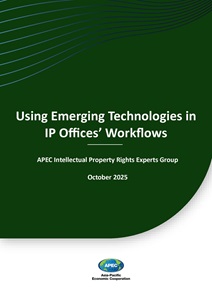
Reports
Using Emerging Technologies in IP Offices’ Workflows
The Asia-Pacific Economic Cooperation (APEC) is a regional economic forum established in 1989 to leverage the growing interdependence of the Asia-Pacific.
The Asia-Pacific Economic Cooperation (APEC) is a regional economic forum established in 1989 to leverage the growing interdependence of the Asia-Pacific.
APEC ensures that goods, services, investment and people move easily across borders. Members facilitate this trade through faster customs procedures at borders; more favorable business climates behind the border; and aligning regulations and standards across the region.
APEC ensures that goods, services, investment and people move easily across borders. Members facilitate this trade through faster customs procedures at borders; more favorable business climates behind the border; and aligning regulations and standards across the region.
APEC works to help all residents of the Asia-Pacific participate in the growing economy.
APEC works to help all residents of the Asia-Pacific participate in the growing economy.
Capacity building projects play an important role in helping translate APEC's goals into reality.
Capacity building projects play an important role in helping translate APEC's goals into reality.

Reports
•February 2025
Download Report
13MB
Published Under
SOM Steering Committee on Economic and Technical Cooperation (SCE), Tourism Working Group (TWG)
Accessed
983
Pages
104
The "Study to Generate Digital Tools for the Transition to Formal Economy of Tourism Businesses in the Asia-Pacific Region, aligns with APEC's Tourism Strategic Plan 2020-2024, focusing on digital transformation and human capital development. The project aimed to identify and assess digital tools that support the formalization of tourism businesses in APEC economies, fostering digital connectivity and easing the transition from informality.
The study was conducted in two phases: a research phase that gathered insights through expert interviews and literature reviews, identifying 14 cases of successful digital formalization; and a workshop held in Lima, Peru, bringing together policymakers, experts, and industry representatives to discuss digital tools for formalization. The event facilitated collaboration and knowledge-sharing, improving digital literacy among participants.
Key findings highlighted the role of e-formalization in reducing bureaucratic barriers, improving business efficiency, and enhancing government services. The report suggests further actions to strengthen digital adoption in the tourism sector and promote sustainable economic formalization.

